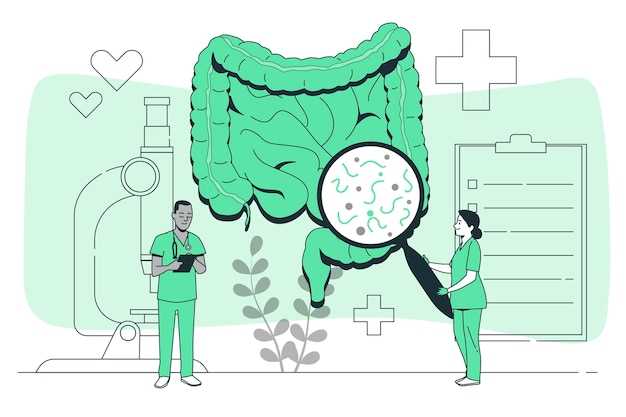
Within the intricate web of our body’s intricate systems lies a fascinating connection that has captivated the attention of scientists and researchers alike. This captivating bond, which intertwines the well-being of our digestive system with the intricate workings of our mind, has been the subject of extensive exploration and study. By delving into the profound relationship between gut health and mental well-being, we uncover a realm of possibilities that may revolutionize our understanding of human health.
At the core of this captivating connection lies the gut, a remarkable organ that is often overlooked in its significance. Nestled within our abdomen, the gut serves as a hub of activity, orchestrating the digestion and absorption of nutrients vital for our physical sustenance. However, recent scientific endeavors have revealed that the gut is not merely a passive player in our bodily functions. Rather, it is an active participant, intricately linked to our brain through a complex network of neurons, hormones, and biochemical signals.
Emerging research has shed light on the profound impact that our gut health can have on our emotional well-being. The gut, often referred to as our “second brain,” houses a vast community of microorganisms known as the gut microbiota. These microscopic inhabitants play a pivotal role in maintaining the delicate balance of our digestive system. However, their influence extends far beyond digestion, as they communicate with our brain through a bidirectional pathway, known as the gut-brain axis.
Gut Microbiota: The Key Player in Mental Health
The intricate relationship between the microbial community residing in the digestive system and the state of our mental well-being has emerged as a fascinating area of research. The gut microbiota, composed of trillions of microorganisms, plays a pivotal role in influencing our mental health. This section delves into the significant impact of gut microbiota on mental well-being, shedding light on the intricate interplay between these two seemingly distinct realms.
1. Gut Microbiota and Emotional Balance:
- The intricate web of microorganisms residing in our gut has a profound influence on our emotional state.
- The gut microbiota communicates with the brain through various pathways, including the vagus nerve and the production of neurotransmitters.
- Imbalances in gut microbiota composition have been linked to mood disorders such as anxiety and depression.
- Understanding the mechanisms through which gut microbiota modulates emotional balance holds promising implications for the development of novel therapeutic interventions.
2. Gut Microbiota and Cognitive Function:
- Emerging evidence suggests that the gut microbiota plays a crucial role in cognitive function and brain health.
- Gut dysbiosis, characterized by an imbalance in gut microbial composition, has been associated with cognitive impairments and neurodegenerative diseases.
- The gut-brain axis, a bidirectional communication system between the gut and the brain, is influenced by the gut microbiota and plays a vital role in cognitive processes.
- Manipulating the gut microbiota through dietary interventions or probiotic supplementation holds potential for enhancing cognitive function and preventing cognitive decline.
3. Gut Microbiota and Stress Response:
- The gut microbiota has been implicated in regulating the body’s response to stress.
- Stress-induced alterations in gut microbiota composition can impact mental health and contribute to the development of stress-related disorders.
- Understanding the intricate interplay between the gut microbiota and stress response mechanisms can pave the way for innovative strategies to manage stress and promote mental well-being.
4. Gut Microbiota and Neurotransmitter Production:
- The gut microbiota plays a crucial role in the production and regulation of neurotransmitters, the chemical messengers that influence brain function and behavior.
- Microbes in the gut produce neurotransmitters such as serotonin, dopamine, and gamma-aminobutyric acid (GABA), which are involved in mood regulation and cognitive processes.
- Imbalances in gut microbiota can disrupt neurotransmitter production, contributing to mental health disorders.
- Targeting the gut microbiota to modulate neurotransmitter levels holds promise for the development of novel therapeutic approaches for mental health conditions.
In conclusion, the gut microbiota emerges as a key player in mental health, exerting a profound influence on emotional balance, cognitive function, stress response, and neurotransmitter production. Understanding the intricate relationship between gut microbiota and mental well-being opens up new avenues for therapeutic interventions and holds the potential to revolutionize the field of mental health.
The Bidirectional Communication: How the Gut Talks to the Brain
In this section, we will delve into the fascinating world of bidirectional communication between the gut and the brain. The intricate network of signals and messages exchanged between these two vital organs plays a crucial role in maintaining overall well-being and influencing various aspects of our mental health.
When we think of communication, we often envision conversations between individuals, but the gut-brain connection introduces a whole new level of communication within our own bodies. The gut, often referred to as the “second brain,” is a complex system of organs responsible for digestion, absorption of nutrients, and elimination of waste. However, its influence extends far beyond these functions.
Through a series of intricate pathways, the gut sends signals to the brain, influencing our emotions, mood, and even cognitive processes. These signals are transmitted through various means, including the gut microbiota, the enteric nervous system, and the release of neurotransmitters and hormones. The gut’s ability to communicate with the brain is a testament to the intricate and interconnected nature of our physiological systems.
One of the key players in this bidirectional communication is the gut microbiota, a diverse community of microorganisms residing in our digestive tract. These microorganisms play a crucial role in maintaining gut health and have been found to have a significant impact on our mental well-being. They produce neurotransmitters, such as serotonin and dopamine, which are known to regulate mood and emotions.
Furthermore, the enteric nervous system, often referred to as the “second brain,” consists of a complex network of neurons lining the gastrointestinal tract. This network not only controls digestion but also communicates with the brain through the vagus nerve, a major pathway connecting the gut and the brain. This constant flow of information allows the gut to influence our thoughts, feelings, and behaviors.
Additionally, the gut releases various hormones and peptides that can directly affect brain function. For example, the hormone ghrelin, known as the “hunger hormone,” not only regulates appetite but also has been found to influence mood and reward-seeking behavior. Similarly, the hormone leptin, which regulates energy balance, has been linked to cognitive function and mental health.
Understanding the bidirectional communication between the gut and the brain opens up new possibilities for interventions and treatments targeting mental health disorders. By focusing on improving gut health, we may be able to positively impact our mental well-being and overall quality of life. The exploration of this fascinating relationship continues to shed light on the intricate mechanisms that govern our physical and mental health.
Gut Health and Mood Disorders: Unraveling the Link
Understanding the intricate relationship between the health of our gut and the development of mood disorders is a complex and fascinating area of research. By delving into the connection between gut health and mood disorders, we can gain valuable insights into the potential causes and treatment options for these conditions.
Exploring the Gut Microbiota
One key aspect of gut health that has garnered significant attention is the gut microbiota, a diverse community of microorganisms residing in our digestive system. These microorganisms play a crucial role in maintaining the balance of our gut and overall well-being. Emerging evidence suggests that alterations in the composition and diversity of the gut microbiota may contribute to the development of mood disorders.
The Gut-Brain Axis: A Bidirectional Communication System

The gut-brain axis serves as a bidirectional communication system between the gut and the brain. This intricate network involves various pathways, including neural, hormonal, and immune signaling. Disruptions in this communication system can lead to imbalances in neurotransmitters and inflammatory responses, potentially influencing mood regulation and contributing to the onset of mood disorders.
| Factors Influencing Gut Health and Mood Disorders |
|---|
| 1. Diet and Nutrition |
| 2. Stress and Psychological Factors |
| 3. Medications and Antibiotics |
| 4. Physical Activity and Exercise |
Several factors can impact both gut health and mood disorders. Diet and nutrition play a crucial role, as certain foods can either promote a healthy gut microbiota or disrupt its balance. Additionally, stress and psychological factors can influence gut health and contribute to the development of mood disorders. Medications, such as antibiotics, can also disrupt the gut microbiota, potentially affecting mental well-being. Lastly, physical activity and exercise have been shown to have a positive impact on both gut health and mood regulation.
By unraveling the link between gut health and mood disorders, researchers aim to develop targeted interventions that can improve both gut health and mental well-being. Understanding the intricate interplay between these two systems holds promise for the development of innovative treatments and interventions for individuals suffering from mood disorders.
Inflammation and Mental Health: The Role of the Gut
Inflammation has emerged as a significant factor in the development and progression of various mental health disorders. This article explores the intricate relationship between inflammation and mental well-being, with a particular focus on the role of the gastrointestinal system.
The Gut-Brain Axis: A Bidirectional Communication System
The gut-brain axis refers to the bidirectional communication network between the gastrointestinal tract and the central nervous system. This complex system involves a constant exchange of signals and molecules, influencing both gut health and mental health. In recent years, research has highlighted the crucial role of inflammation in disrupting this delicate balance.
The Impact of Gut Inflammation on Mental Health
Chronic inflammation in the gut can have profound effects on mental health. Studies have shown that increased gut permeability, often referred to as “leaky gut,” can lead to the release of pro-inflammatory molecules into the bloodstream. These molecules can then cross the blood-brain barrier and trigger neuroinflammation, contributing to the development of psychiatric disorders such as depression, anxiety, and even cognitive decline.
| Effects of Gut Inflammation on Mental Health | Examples |
|---|---|
| Depression | Increased levels of pro-inflammatory cytokines have been associated with depressive symptoms. |
| Anxiety | Gut inflammation can activate the hypothalamic-pituitary-adrenal axis, leading to anxiety-like behaviors. |
| Cognitive Decline | Chronic gut inflammation has been linked to cognitive impairment and an increased risk of neurodegenerative diseases. |
Furthermore, imbalances in the gut microbiota, known as dysbiosis, can also contribute to inflammation and mental health disorders. Disruptions in the diversity and composition of gut bacteria have been associated with various psychiatric conditions, highlighting the intricate interplay between gut health and mental well-being.
In conclusion, inflammation plays a significant role in the development and progression of mental health disorders. Understanding the connection between gut inflammation and mental well-being is crucial for developing targeted interventions and therapies that can improve both gut health and mental health outcomes.
Gut Health and Anxiety: Understanding the Gut-Brain Axis
Anxiety is a common mental health condition that affects millions of people worldwide. While it is often believed to be solely related to the brain, emerging research suggests that there is a strong connection between gut health and anxiety. This connection, known as the gut-brain axis, highlights the intricate relationship between the gut and the brain, and how imbalances in gut health can contribute to the development and exacerbation of anxiety symptoms.
The Gut-Brain Axis: A Bidirectional Communication System
The gut-brain axis refers to the complex network of communication between the gut and the brain. It involves a bidirectional flow of signals and messages, allowing the gut and the brain to constantly interact and influence each other. This communication occurs through various pathways, including the nervous system, immune system, and endocrine system.
Research has shown that the gut microbiota, which consists of trillions of microorganisms residing in the gut, plays a crucial role in this communication. These microorganisms produce neurotransmitters, such as serotonin and gamma-aminobutyric acid (GABA), which are known to regulate mood and anxiety. Imbalances in the gut microbiota can disrupt the production of these neurotransmitters, leading to increased anxiety levels.
The Impact of Gut Health on Anxiety
Studies have found a strong association between gut health and anxiety. Individuals with conditions such as irritable bowel syndrome (IBS) and inflammatory bowel disease (IBD) often experience higher levels of anxiety. This suggests that the gut inflammation and dysbiosis associated with these conditions can contribute to the development of anxiety symptoms.
Furthermore, chronic stress, a known trigger for anxiety, can also negatively impact gut health. Stress activates the body’s stress response system, leading to changes in gut motility, increased intestinal permeability, and alterations in the gut microbiota composition. These changes can further exacerbate anxiety symptoms.
- Increased gut permeability allows toxins and bacteria to leak into the bloodstream, triggering an immune response and inflammation, which can affect brain function and contribute to anxiety.
- Alterations in the gut microbiota composition can disrupt the production of neurotransmitters involved in mood regulation, leading to imbalances that contribute to anxiety.
Understanding the gut-brain axis and the impact of gut health on anxiety is crucial for developing effective treatment strategies. By targeting gut health through dietary interventions, probiotics, and stress management techniques, it may be possible to alleviate anxiety symptoms and improve overall mental well-being.
Improving Mental Health through Gut Health: Strategies and Interventions
In this section, we will explore various approaches and techniques that can be employed to enhance mental well-being by focusing on the health of the gastrointestinal system. By recognizing the intricate interplay between the gut and the brain, we can develop effective strategies and interventions to promote mental health.
One key aspect to consider is the role of nutrition in supporting a healthy gut and, consequently, a healthy mind. A balanced diet rich in fiber, probiotics, and prebiotics can foster the growth of beneficial gut bacteria, which have been linked to improved mood and reduced symptoms of anxiety and depression. Incorporating foods such as whole grains, fruits, vegetables, and fermented products can provide the necessary nutrients to support a thriving gut microbiome.
Furthermore, stress management techniques play a crucial role in maintaining gut health and mental well-being. Chronic stress can disrupt the delicate balance of the gut-brain axis, leading to inflammation and negative effects on mental health. Engaging in activities such as mindfulness meditation, yoga, and deep breathing exercises can help reduce stress levels and promote a healthier gut environment.
Another intervention to consider is the use of probiotic supplements. These live microorganisms can help restore and maintain a diverse gut microbiota, which is essential for optimal mental health. Research has shown that certain strains of probiotics can alleviate symptoms of depression and anxiety, suggesting their potential as a complementary treatment option.
Additionally, lifestyle factors such as regular exercise and adequate sleep can significantly impact gut health and mental well-being. Physical activity has been shown to enhance gut microbial diversity and improve mood, while sleep deprivation can disrupt the gut-brain axis and contribute to mental health disorders. Prioritizing these lifestyle factors can contribute to a healthier gut and a more resilient mind.
| Strategies and Interventions for Improving Mental Health through Gut Health |
|---|
| 1. Emphasize a balanced diet rich in fiber, probiotics, and prebiotics |
| 2. Practice stress management techniques like mindfulness meditation and yoga |
| 3. Consider the use of probiotic supplements |
| 4. Incorporate regular exercise into your routine |
| 5. Prioritize adequate sleep for optimal gut-brain function |
By implementing these strategies and interventions, individuals can take proactive steps towards improving their mental health by nurturing their gut health. Recognizing the profound connection between the gut and the brain opens up new possibilities for holistic approaches to mental well-being.



